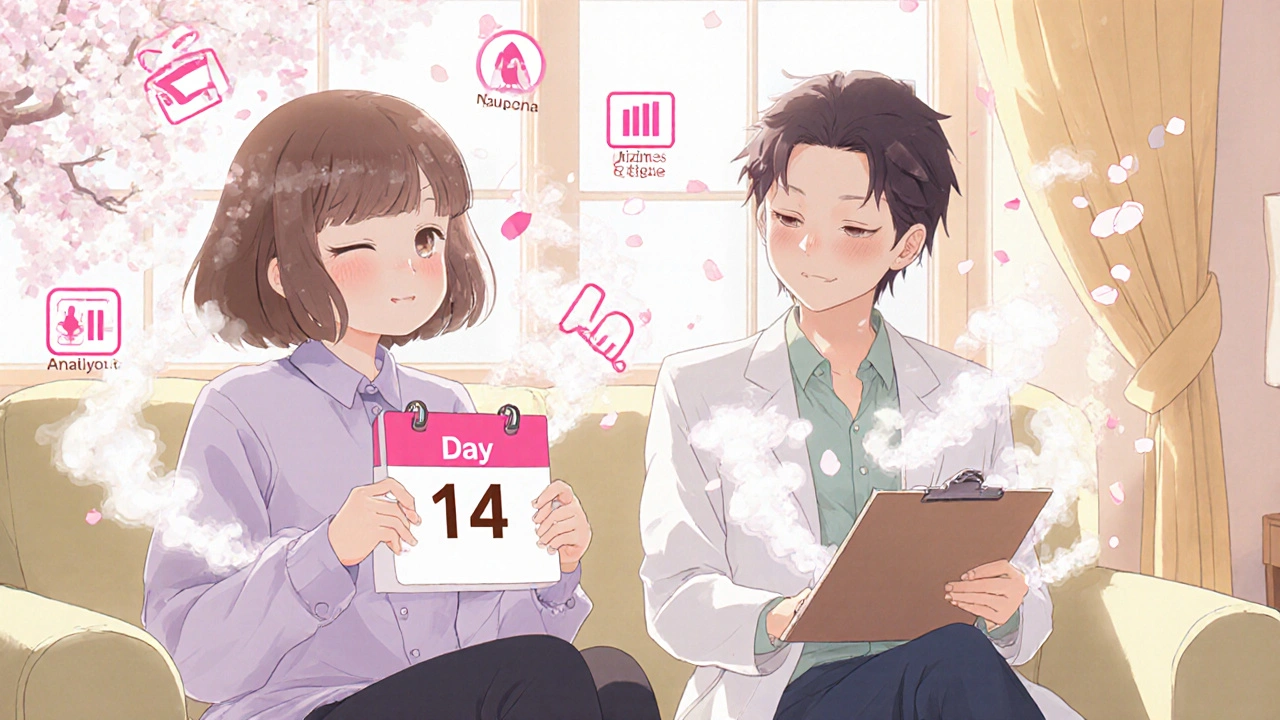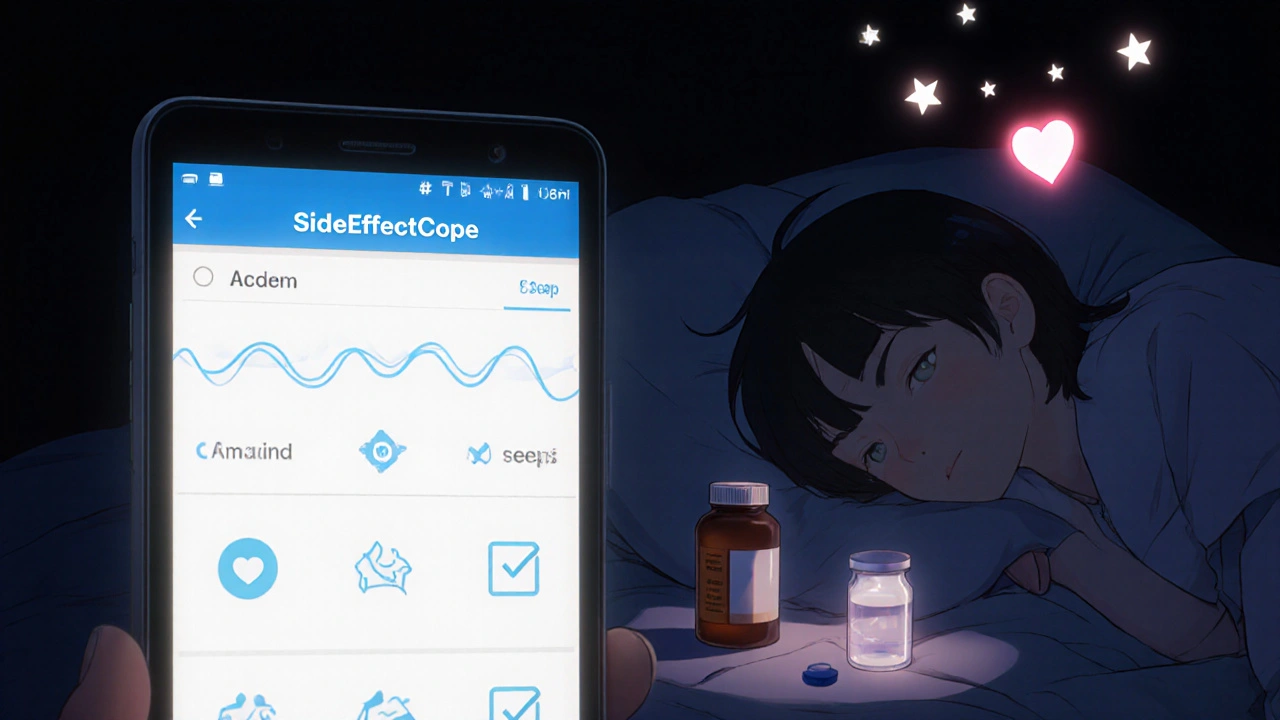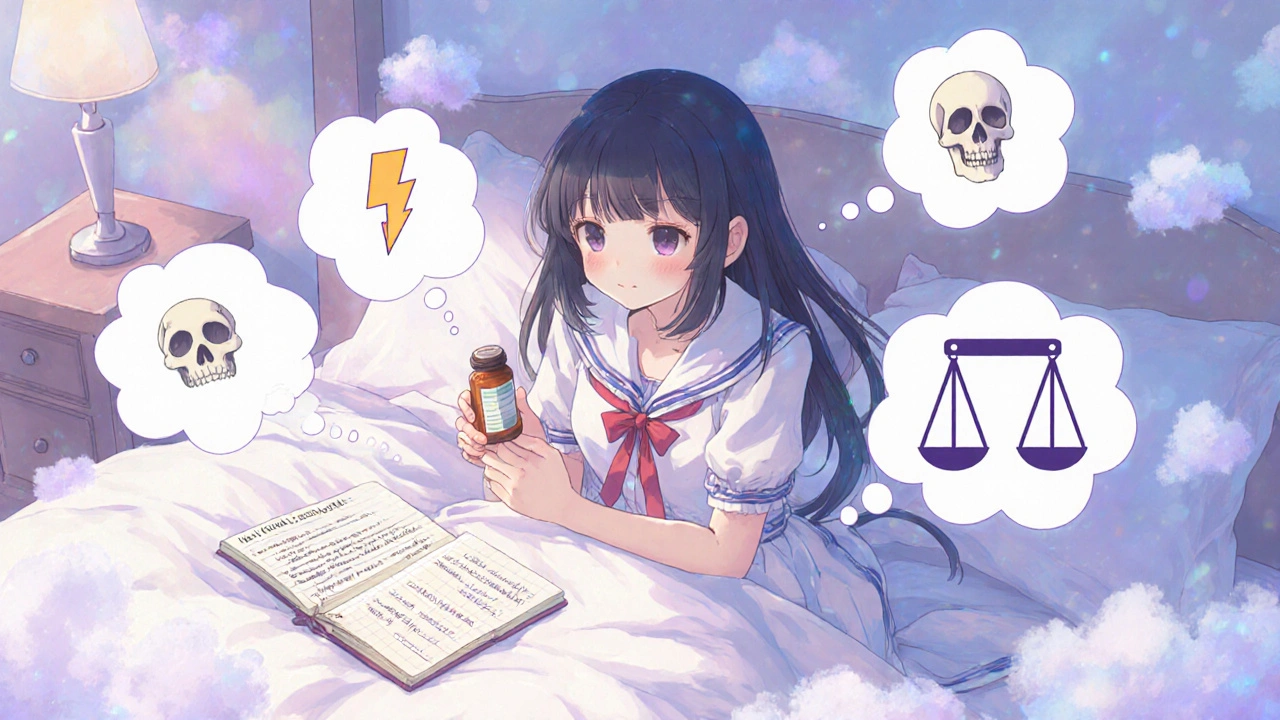Medication Side Effect Timeline Calculator
Track Your Side Effect Timeline
Enter your medication start date to see when common side effects typically peak and improve based on Mayo Clinic guidelines.
Feeling sick to your stomach after taking your new pill? Worried that the dizziness means something’s seriously wrong? You’re not alone. Around 60% of people on long-term medications like blood pressure drugs or antidepressants report anxiety about side effects - and many end up stopping their treatment because of it. But here’s the truth: most of what you’re feeling isn’t the drug itself. It’s your brain reacting to fear.
Why Your Mind Makes Side Effects Worse
It’s not just in your head - it’s your brain’s wiring. The nocebo effect is real. When you expect a side effect, your body can actually create it. A 2020 study found that people told a medication might cause headaches were far more likely to report headaches - even when they got a sugar pill. This isn’t weakness. It’s biology. Your brain is wired to protect you. When you hear “this drug can cause fatigue,” your nervous system starts scanning for any hint of tiredness. Suddenly, that normal afternoon slump feels like proof the drug is harming you.Most Side Effects Fade - Here’s When
If you’ve just started a new medication, especially an SSRI for anxiety or depression, your body is adjusting. The nausea, dizziness, sleep issues - they’re usually temporary. According to Mayo Clinic’s 2023 guidelines, 70-80% of common antidepressant side effects improve within 2 to 4 weeks. Nausea? Peaks around day 3-5, fades by day 14-21. Insomnia? Taking the pill in the morning instead of at night cuts sleep problems from 35% to 15% in most people. Fatigue? Often lifts after the first two weeks. Knowing this timeline isn’t just comforting - it’s a game-changer for sticking with treatment.What Actually Works: Proven Psychological Tools
There are four science-backed strategies that help people stop fearing their meds and start feeling better.- Cognitive Restructuring: This is about challenging the worst-case stories your brain tells. Instead of thinking, “This dizziness means I’m having a stroke,” ask: “What’s the real chance of that?” Most people realize the odds are near zero. A 2022 study showed this technique alone reduced medication discontinuation by 58% compared to just taking the pill.
- Symptom Normalization: Learn what’s normal and what’s not. For example, mild nausea in the first week of an SSRI? Normal. Chest pain or swelling? Not normal. When you know the difference, you stop panicking over everyday sensations.
- Probability Testing: Write down your fear - “I’ll get severe liver damage.” Then list the facts: “I’ve had two liver tests in the last year - both normal. No one I know on this drug had liver damage.” This simple exercise cuts anxiety by 72%, according to patient reviews.
- The Two-Week Rule: Commit to taking your medication for 14 days, no matter how bad you feel. Use that time to track symptoms, use coping strategies, and see what actually changes. Most people who stick to this rule find their fears were exaggerated.

How CBT and ACT Help - And Which One Fits You
Cognitive Behavioral Therapy (CBT) is the gold standard. It’s structured, time-limited (6-12 sessions), and proven to reduce medication anxiety by 65-75%. You work with a therapist to identify fear triggers, test them, and replace panic thoughts with facts. Acceptance and Commitment Therapy (ACT) is different. Instead of fighting anxious thoughts, you learn to notice them without letting them control you. ACT has similar results to CBT but works better for people who feel stuck in their worries. One 2023 study found that after six months, 72% of ACT users were still taking their meds - compared to 65% for CBT. Mindfulness practices like MBSR (Mindfulness-Based Stress Reduction) can also help. An 8-week program can cut anxiety as much as 6 CBT sessions - and it’s easier to find online or through apps.What to Do When Your Doctor Doesn’t Help
Too many patients say their doctor dismissed their fears: “It’s all in your head.” That makes things worse. If your provider doesn’t talk about psychological strategies, take charge. Bring printouts from Mayo Clinic or HelpGuide.org. Say: “I want to keep taking this medication, but I need help managing my anxiety about side effects. Can we talk about coping tools?” If they still don’t help, look for a therapist who specializes in health anxiety or chronic illness. Many now offer telehealth sessions. Apps like SideEffectCope - FDA-approved in March 2024 - walk you through CBT exercises designed just for medication anxiety. They’re not a replacement for care, but they’re a bridge.Real People, Real Results
One woman in New Zealand, 45, had been on an SSRI for generalized anxiety. She’d quit three times because of nausea and fatigue. After learning the two-week rule and tracking her symptoms in a journal, she realized: the worst days were always days 3-7. After day 14, she felt better. She stayed on the medication. Her anxiety dropped by 60% in three months. On Reddit, a user wrote: “I started journaling every side effect. I saw patterns. The dizziness only happened when I skipped breakfast. The sleep issues? I was taking my pill at 9 p.m. I moved it to 8 a.m. Problem solved.” These aren’t lucky breaks. They’re proof that understanding your brain’s role in side effects changes everything.
What’s Changing in Healthcare
The field is shifting. In 2023, Medicare required all prescription counseling to include strategies for managing treatment-related anxiety. Kaiser Permanente now uses standardized protocols across 39 centers. The global market for psychological support in medication management is growing at nearly 20% a year. But here’s the gap: only 35% of primary care clinics offer formal psychological help. Most patients still get a pill and a “take as directed.” That’s why you need to be your own advocate. You don’t need to wait for the system to catch up. You can start today - with a journal, a timeline, and a willingness to question your fears.When to Be Worried - And When to Keep Going
Not every symptom is anxiety. If you have swelling, chest pain, trouble breathing, severe rash, or sudden confusion - get help immediately. Those are red flags. But if you feel tired after a week, have mild nausea, or can’t sleep on a new dose? That’s likely your brain, not your body. Most side effects are temporary. Most fears are exaggerated. Most people who stick with it - even through the rough first few weeks - end up feeling better than they did before they started.What You Can Do Right Now
- Write down your top three fears about your medication.
- Look up the typical side effect timeline for your drug (Mayo Clinic and HelpGuide.org are reliable).
- Commit to taking your medication for 14 days - no matter what.
- Track symptoms daily: what you felt, when, and what you did (ate? slept? moved around?).
- Ask yourself: “Is this fear based on facts - or fear?”
Can anxiety make side effects worse?
Yes. Anxiety triggers the nocebo effect - where expecting a side effect actually causes it. Stress hormones can increase nausea, dizziness, and fatigue. Studies show people who fear side effects report them more often - even when taking placebos.
How long do SSRI side effects last?
Most common side effects like nausea, dizziness, and fatigue peak within the first 3-5 days and improve significantly by day 14-21. Insomnia often clears up if you take the medication in the morning instead of at night. Full stabilization usually happens within 4-6 weeks.
Is CBT better than just taking medication?
Yes, for adherence. A 2022 meta-analysis found CBT reduced treatment discontinuation by 58% compared to medication alone. It doesn’t replace the drug - it helps you stay on it. People who use CBT are more likely to stick with treatment long-term and report better quality of life.
What if my doctor says my anxiety is “all in my head”?
That’s not helpful - and it’s outdated. Anxiety about side effects is a real psychological response, not weakness. Politely say: “I understand it’s not physical, but it’s real to me. Can we talk about evidence-based tools like CBT or symptom tracking to help me manage it?” If they refuse, ask for a referral to a mental health provider who works with chronic illness.
Are there apps that help with medication anxiety?
Yes. SideEffectCope, approved by the FDA in March 2024, uses CBT techniques to help users challenge fears about side effects. Other apps like Woebot and MindShift also offer cognitive tools for health anxiety. They’re not replacements for therapy, but they’re proven tools for daily support.
When should I stop a medication because of side effects?
Stop only if you have signs of a serious reaction: swelling, trouble breathing, chest pain, severe rash, confusion, or suicidal thoughts. For common side effects like nausea or fatigue, wait at least 14 days and try coping strategies first. Most improve on their own. Never stop abruptly without talking to your doctor - especially with antidepressants or blood pressure meds.

Shivam Goel
November 24, 2025 AT 13:22Amy Hutchinson
November 24, 2025 AT 17:30prasad gaude
November 26, 2025 AT 04:17Srikanth BH
November 27, 2025 AT 23:37Jennifer Griffith
November 28, 2025 AT 20:28Josh Zubkoff
November 30, 2025 AT 16:27fiona collins
December 1, 2025 AT 17:42Emily Craig
December 2, 2025 AT 08:10Karen Willie
December 4, 2025 AT 04:41Sharley Agarwal
December 6, 2025 AT 01:40Timothy Sadleir
December 6, 2025 AT 02:25Roscoe Howard
December 6, 2025 AT 08:29Kimberley Chronicle
December 7, 2025 AT 00:28Shirou Spade
December 8, 2025 AT 16:38